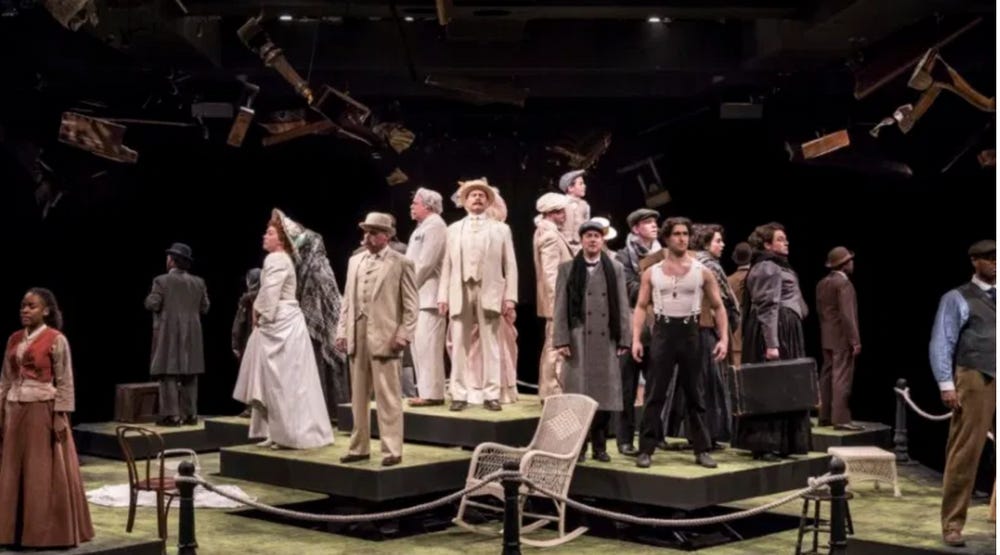Ragtime
Review: RAGTIME at Marriott Theatre
Pictured: The cast of RAGTIME. Photo by Liz Lauren.
A music genre described as “a rhythmic base of metric affirmation, and a melody of metric denial,” RAGTIME leaves me with a sense of displacement in the production currently running at Marriott Theatre. A musical, the likes of which my eyes and ears rarely get to feast on, whose perfectly executed theatrical elements make you beam in delight of how quite awesome “the American musical” can be, also manages to wrap up a message of turbulent relations in a neat little white bow sprinkled with a confetti of racial slurs. I thought the time of seeing reality through rose tinted glasses was coming to an end.
Despite my problems with the message of this story, I must admit, this is one extremely well done show. The moving elements intertwine flawlessly from Jesse Klug’s dynamic lights to Jeffrey D. Kmiec’s subtle but effective set. Theresa Ham’s costumes transfer you to the turn of the 20th century with ease. And that beautifully textured music by Stephen Flaherty wafting ragtime and gospel and march through the theatre! An exquisite experience, really.
The ensemble is filled with high quality performances: the velvety voice of Nathaniel Stampley (portraying the justice seeking Coalhouse Walker, Jr.), the authentic and subtle Kathy Voytko (as the empathic Mother), the delightful and sweetly channeled innocence of Patrick Scott McDermott (as The Little Boy), the moving and funny Benjamin Magnuson (as the passionate Tateh), the spot-on Katherine Thomas (as the gut-wrenching Sarah, delivering the first moving moment of the play while singing to her abandoned baby, even though the character is written with hardly any prior context), and the show stopping pipes of Keirsten Hodgens whose unnamed character produces a goose-bumping-blood-chilling-hand-raising Gospel. There isn’t a single unconvincing performer in this talented cast. And with Kenneth L. Roberson’s artful choreography, the stage pulsates with perfect musicality. The number “What a Game” is a definite highlight. Greatness abounds in this production, it is seeping out its seams. So, why isn’t it exactly ripping my heart open?
The problem might be hiding within the perspective from which this story is told. Written post-Civil Rights Movement, but about a time before it, a loosely-based-on-real-events tale, interwoven with fictitious and historical figures, with protagonists who suffer social injustices, but whose side of the story is merely seen through wealthy white lace…RAGTIME has all the right rhythm, but not quite the right voice. The first to speak is The Little Boy, representing rich Anglo-Saxon America. A myriad of characters follow suit, all giving a bit of an introductory speech, such as Tateh and his daughter – the Jewish immigrants who seek a better life in the New World. The canvas is painted through all their eyes. The dusty brown of suffering is palpable, the fluffy pink of riches is desirable. When we are introduced to a talented piano man, Coalhouse Walker Jr., the palette expands to include a new bouquet of colors, as ragtime pours out his fingers, people dance and move with a real aliveness, and yet, the number feels distant and short-lived, as if we are voyeurs peeking through a fogged up window but got caught by the owners and shooed away. This side of the story does not address the audience. This perspective remains removed. As we follow Coalhouse through his journey, his character is both admirable and flawed. At first, his stubbornness prevails as he won’t take “no” for an answer from Sarah (the two lead female characters in this play are not only victims of their patriarchal time, but also victims of bookwriter Terrance McNally’s lack of understanding of feminine complexity), and ultimately his hubris leads to his downfall as he refuses to marry Sarah until justice is served. “Pride goeth before a fall,” indeed. Other characters also fail to rise above their expectations, as a rags-to-riches Tateh never looks back to help his fellow immigrants, a privileged Mother never seeks help from a culture whose child she has taken on the responsibility of raising.
Director Nick Bowling says this about the play: “When it was done in the late 90’s, it was a show about progress – look how far we’ve come. Today, it’s a little more – look how far we have to go.” I agree we have lots more to go, but I hope we are farther along than assuming the rich whites are gonna save the day. At least, not by having a happy-ending picnic while the ghosts of the black ancestors look on, smiling. And if a racist comes to spit on their happiness, having everyone just give him “the eye” feels like the equivalent of the good ol’ FB echochamber posts where you can just make it all better if you tell people how you feel about it. In the end, RAGTIME leaves me with a feeling of strange syncopation – one that results in systematic affirmation with intentions of systematic denial. I am ready to propagate stories of how it ought to be. We know the ones that speak to how it’s been.
February 4th, 2018





